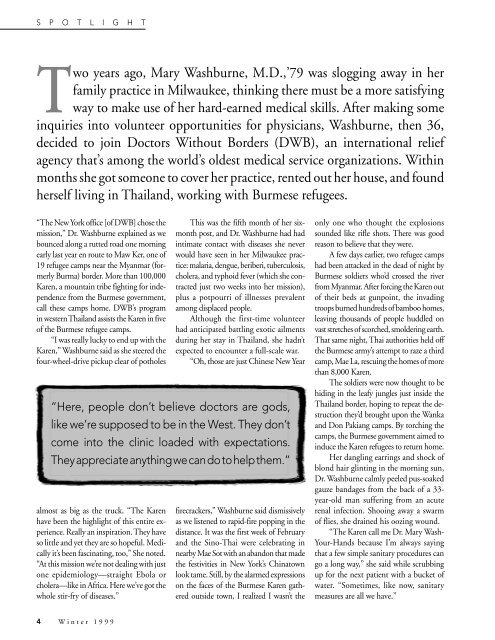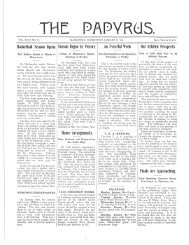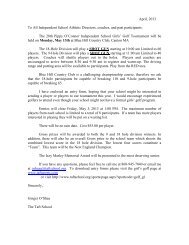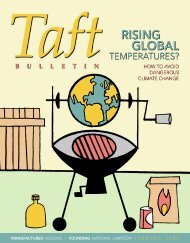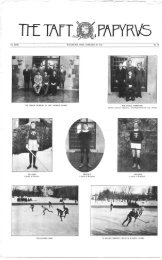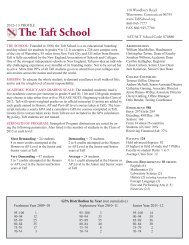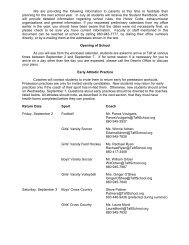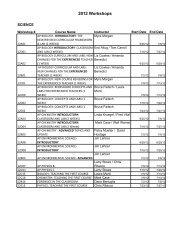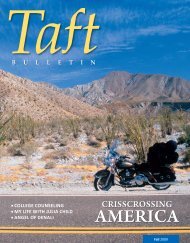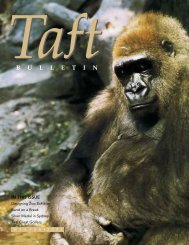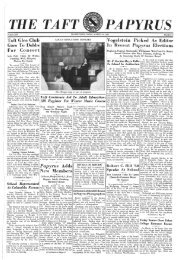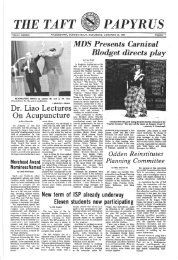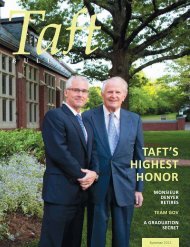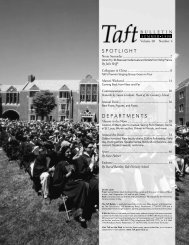S P O T L I G H T D E P A R T M E N T S - The Taft School
S P O T L I G H T D E P A R T M E N T S - The Taft School
S P O T L I G H T D E P A R T M E N T S - The Taft School
You also want an ePaper? Increase the reach of your titles
YUMPU automatically turns print PDFs into web optimized ePapers that Google loves.
S P O T L I G H T<br />
Two years ago, Mary Washburne, M.D.,’79 was slogging away in her<br />
family practice in Milwaukee, thinking there must be a more satisfying<br />
way to make use of her hard-earned medical skills. After making some<br />
inquiries into volunteer opportunities for physicians, Washburne, then 36,<br />
decided to join Doctors Without Borders (DWB), an international relief<br />
agency that’s among the world’s oldest medical service organizations. Within<br />
months she got someone to cover her practice, rented out her house, and found<br />
herself living in Thailand, working with Burmese refugees.<br />
“<strong>The</strong> New York office [of DWB] chose the<br />
mission,” Dr. Washburne explained as we<br />
bounced along a rutted road one morning<br />
early last year en route to Maw Ker, one of<br />
19 refugee camps near the Myanmar (formerly<br />
Burma) border. More than 100,000<br />
Karen, a mountain tribe fighting for independence<br />
from the Burmese government,<br />
call these camps home. DWB’s program<br />
in western Thailand assists the Karen in five<br />
of the Burmese refugee camps.<br />
“I was really lucky to end up with the<br />
Karen,” Washburne said as she steered the<br />
four-wheel-drive pickup clear of potholes<br />
almost as big as the truck. “<strong>The</strong> Karen<br />
have been the highlight of this entire experience.<br />
Really an inspiration. <strong>The</strong>y have<br />
so little and yet they are so hopeful. Medically<br />
it’s been fascinating, too,” She noted.<br />
“At this mission we’re not dealing with just<br />
one epidemiology—straight Ebola or<br />
cholera—like in Africa. Here we’ve got the<br />
whole stir-fry of diseases.”<br />
This was the fifth month of her sixmonth<br />
post, and Dr. Washburne had had<br />
intimate contact with diseases she never<br />
would have seen in her Milwaukee practice:<br />
malaria, dengue, beriberi, tuberculosis,<br />
cholera, and typhoid fever (which she contracted<br />
just two weeks into her mission),<br />
plus a potpourri of illnesses prevalent<br />
among displaced people.<br />
Although the first-time volunteer<br />
had anticipated battling exotic ailments<br />
during her stay in Thailand, she hadn’t<br />
expected to encounter a full-scale war.<br />
“Oh, those are just Chinese New Year<br />
“Here, people don’t believe doctors are gods,<br />
like we’re supposed to be in the West. <strong>The</strong>y don’t<br />
come into the clinic loaded with expectations.<br />
<strong>The</strong>y appreciate anything we can do to help them.”<br />
firecrackers,” Washburne said dismissively<br />
as we listened to rapid-fire popping in the<br />
distance. It was the first week of February<br />
and the Sino-Thai were celebrating in<br />
nearby Mae Sot with an abandon that made<br />
the festivities in New York’s Chinatown<br />
look tame. Still, by the alarmed expressions<br />
on the faces of the Burmese Karen gathered<br />
outside town, I realized I wasn’t the<br />
only one who thought the explosions<br />
sounded like rifle shots. <strong>The</strong>re was good<br />
reason to believe that they were.<br />
A few days earlier, two refugee camps<br />
had been attacked in the dead of night by<br />
Burmese soldiers who’d crossed the river<br />
from Myanmar. After forcing the Karen out<br />
of their beds at gunpoint, the invading<br />
troops burned hundreds of bamboo homes,<br />
leaving thousands of people huddled on<br />
vast stretches of scorched, smoldering earth.<br />
That same night, Thai authorities held off<br />
the Burmese army’s attempt to raze a third<br />
camp, Mae La, rescuing the homes of more<br />
than 8,000 Karen.<br />
<strong>The</strong> soldiers were now thought to be<br />
hiding in the leafy jungles just inside the<br />
Thailand border, hoping to repeat the destruction<br />
they’d brought upon the Wanka<br />
and Don Pakiang camps. By torching the<br />
camps, the Burmese government aimed to<br />
induce the Karen refugees to return home.<br />
Her dangling earrings and shock of<br />
blond hair glinting in the morning sun,<br />
Dr. Washburne calmly peeled pus-soaked<br />
gauze bandages from the back of a 33-<br />
year-old man suffering from an acute<br />
renal infection. Shooing away a swarm<br />
of flies, she drained his oozing wound.<br />
“<strong>The</strong> Karen call me Dr. Mary Wash-<br />
Your-Hands because I’m always saying<br />
that a few simple sanitary procedures can<br />
go a long way,” she said while scrubbing<br />
up for the next patient with a bucket of<br />
water. “Sometimes, like now, sanitary<br />
measures are all we have.”<br />
4 Winter 1999


